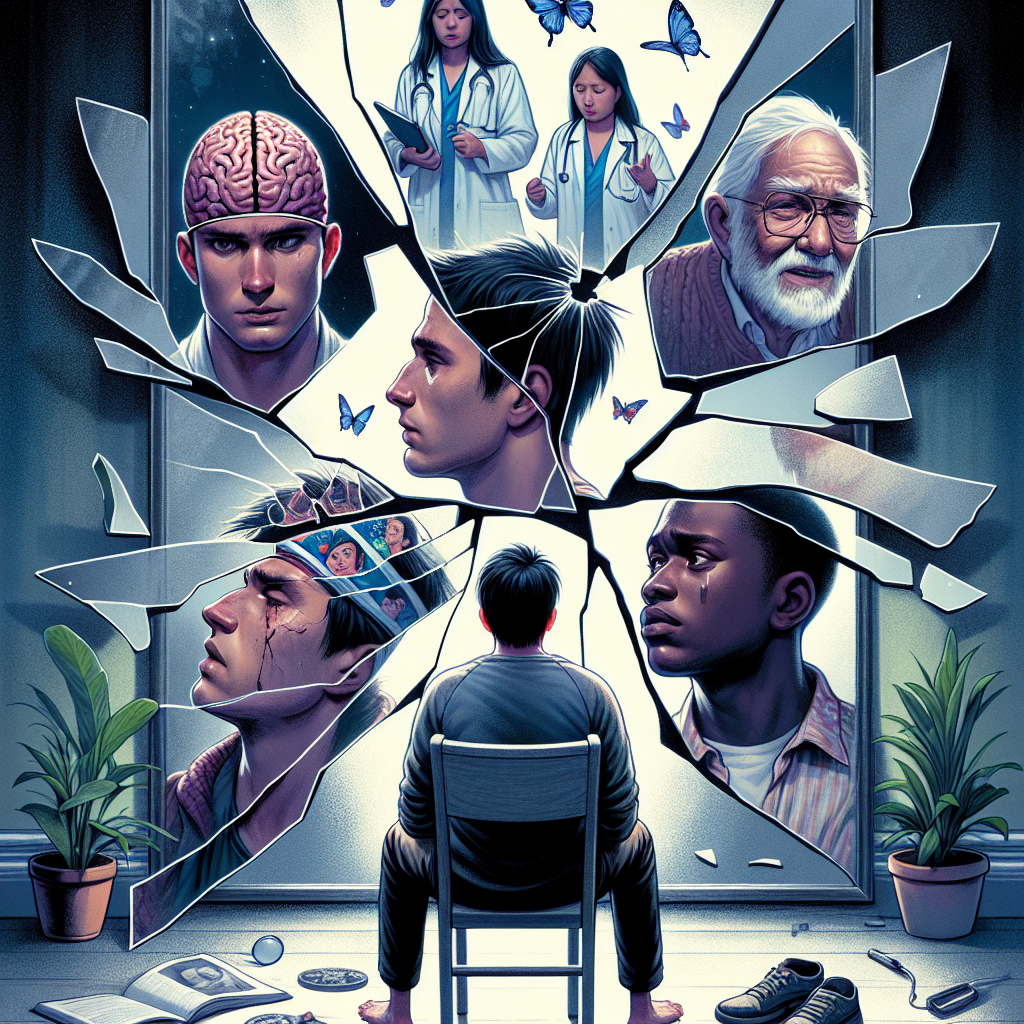Definition: What is Schizophrenia?
Schizophrenia is a severe neurological illness that disrupts normal brain function. Individuals with schizophrenia often experience difficulties distinguishing reality from unreality, managing their emotions, thinking clearly, and interacting socially. It is NOT a split personality, a common misconception.
Healthcare professionals classify it among psychotic disorders, based on the presence of psychotic symptoms such as hallucinations or delusions. Schizophrenia affects approximately 1% of the global population, and its impact on daily life can be considerable without adequate treatment.
Causes and Risk Factors
Scientists do not know a single, specific cause for schizophrenia. They believe it results from a complex combination of factors that interact to lead to the development of the illness.
Key factors involved include:
- Genetic Factors: A family history increases the risk. However, most individuals with schizophrenia do not have affected relatives.
- Brain Chemical Imbalances: Abnormalities in neurotransmitters like dopamine and glutamate play a significant role.
- Brain Structural Abnormalities: Imaging studies have shown differences in some individuals with schizophrenia.
- Environmental Factors: Birth complications, in-utero exposure to viruses, or the use of certain drugs can modulate risk. Cannabis, for example, can precipitate the onset of schizophrenia in vulnerable individuals.
These combined elements increase an individual’s vulnerability to the illness.
Symptoms and Signs of Schizophrenia
Schizophrenia symptoms vary from person to person and are often grouped into several categories:
- Positive Symptoms: The term “positive” does not mean good; it indicates the presence of behaviors or thoughts added to normal functions. Examples:
- Hallucinations (auditory, visual, olfactory, tactile)
- Delusions (irrational and unshakable beliefs despite evidence to the contrary)
- Thought disorders (disorganized thoughts, difficulty organizing ideas)
- Disorganized or abnormal behavior (agitation, bizarre actions)
- Negative Symptoms: The term “negative” signifies a loss or decrease in normal functions. Examples:
- Decreased emotional expression (flat affect, lack of vocal tone)
- Lack of motivation (difficulty initiating or maintaining activities)
- Reduced speech (alogia)
- Social withdrawal (isolation)
- Cognitive Symptoms: These affect memory, attention, and planning. Examples:
- Concentration difficulties
- Working memory problems
- Difficulty understanding abstract concepts
Early recognition of these signs significantly improves the prognosis.
Diagnosing Schizophrenia: How is it Detected?
Schizophrenia diagnosis does not rely on a single test. A psychiatrist or mental health professional establishes the diagnosis by evaluating symptoms, their duration, and their impact on the person’s daily life.
The diagnostic process typically includes:
- A physical exam: This ensures that symptoms are not caused by another medical condition.
- Laboratory tests: These help rule out other causes (substance abuse, other neurological diseases).
- A psychiatric evaluation: The professional discusses thoughts, behaviors, and family history. They use established diagnostic criteria, such as those from the Diagnostic and Statistical Manual of Mental Disorders (DSM-5).
These criteria require the presence of characteristic symptoms for a significant period, which must also cause social or occupational dysfunction.
Treatments and Management of Schizophrenia
Schizophrenia treatment typically combines several approaches aimed at reducing symptoms and improving quality of life. Treatment is often long-term.
- Antipsychotic medications: These reduce positive symptoms (hallucinations, delusions) by acting on brain neurotransmitters. Adjusting the dose and type of medication is necessary.
- Psychotherapy: Cognitive Behavioral Therapy (CBT) helps individuals manage their symptoms and develop coping strategies.
- Psychosocial rehabilitation: This helps individuals acquire the skills necessary for independent living, including illness education, vocational training, and social skills acquisition.
- Family support: Education and support from loved ones play a crucial role in treatment success.
An individualized and continuous treatment plan yields the best results.
Recent Scientific Advancements in Schizophrenia (June 2025)
Schizophrenia research is highly active, exploring new avenues. In the first half of 2025, new advancements have emerged.
Efforts are focused on:
- Early biomarkers: Studies are focused on identifying early markers of the disease using advanced brain imaging techniques. They are also researching specific genetic or blood profiles. These markers would allow for diagnosis and intervention before the full onset of symptoms.
- Targeted therapies: New molecules are exploring different mechanisms of action than classic antipsychotics. They specifically target other neurotransmitter systems and inflammatory pathways involved in schizophrenia. This could improve the treatment of negative and cognitive symptoms, which are often less well-controlled.
- Precision medicine: Research is exploring the use of artificial intelligence to predict individual responses to treatments. This would allow for personalized treatment, where doctors could adjust therapeutic protocols based on the patient’s genetic or clinical profile, thereby optimizing effectiveness and reducing side effects.
These researches promise to significantly improve patient care in the future.
Preventing Schizophrenia: Is it Possible to Reduce the Risk?
Schizophrenia prevention presents a challenge. Healthcare professionals do not know a single method to prevent it. However, they know that certain factors can increase or decrease the risk.
Risk reduction strategies include:
- Early detection: Identifying early signs and intervening quickly can slow disease progression and even reduce its severity.
- Stress management: Periods of intense stress can trigger psychotic episodes. Stress management techniques can sometimes help prevent these episodes.
- Avoiding psychoactive substances: Cannabis, alcohol, and other drugs can precipitate or worsen schizophrenia in vulnerable individuals.
- Psychosocial support: A stable environment and strong social support can play a protective role.
Awareness of risk factors and warning signs remains essential.
Living with Schizophrenia
Living with schizophrenia is an ongoing process that requires adaptation and support. Many people with schizophrenia lead fulfilling and productive lives with appropriate treatment.
Strategies for living well include:
- Adhering to treatment: Regular medication intake and participation in therapies are essential.
- Developing coping strategies: Learning to manage symptoms and stress improves quality of life.
- Maintaining a healthy lifestyle: Regular exercise, a balanced diet, and good sleep contribute to mental well-being.
- Building a support network: Support from family, friends, and support groups is crucial.
- Setting realistic goals: Establishing personal and professional goals helps maintain motivation and self-esteem.
Recovery is a personal journey and varies for each individual.
Frequently Asked Questions (FAQ)
Is schizophrenia hereditary?
Schizophrenia is not directly hereditary, but it does have a significant genetic component. A family history increases the risk, but other factors interact with genetics to cause the disease.
Is a person with schizophrenia dangerous?
The vast majority of people with schizophrenia are not violent; they are more often victims of violence than perpetrators. Violence, if it occurs, is often linked to untreated delusions or substance use.
Can schizophrenia be cured?
Schizophrenia is a chronic illness; it is not “cured” in the sense of a complete disappearance of symptoms. However, continuous treatment and good management allow many people to live stable and productive lives. The term “recovery” is often used instead of “cure.”
How can I help a loved one with schizophrenia?
To help a loved one with schizophrenia, encourage them to follow their treatment. Educate yourself about the illness. Offer emotional support. Be patient and understanding. Participate in family support groups. Avoid judgment.
Can stress cause schizophrenia?
Intense stress does not directly cause schizophrenia. However, stress can trigger or worsen symptoms in a vulnerable person. It can also precipitate a first psychotic episode in someone who is already predisposed.
Additional resources
- To extend your knowledge and decipher other markers, more articles are available here.
Confused by your blood test results?
Get instant clarity. AI DiagMe interprets your blood test results online in minutes. Our secure platform translates complex medical data into an easy-to-understand report. Take control of your health today. Visit aidiagme.com to get your personalized insights now.

